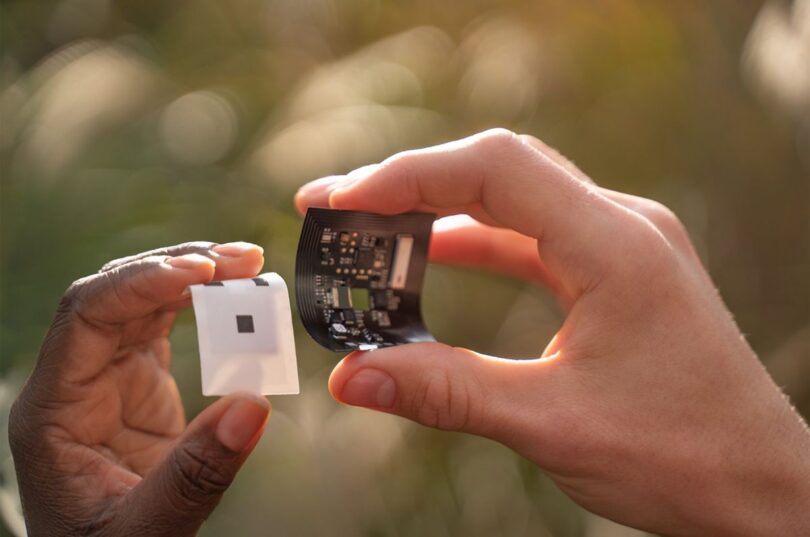Batteries are everywhere in our modern world. They are convenient and cheap, but their environmental impacts are a growing concern. The time has come to reconsider our reliance on batteries and find new solutions that are better for our planet.
BeFC is working to overcome this challenge and improve the future of electricity with its paper biofuel cells. They have developed an eco-friendly, sustainable energy source that can help to protect the environment, paving the way for a greener future.
The Problem
Billions of batteries are disposed of every year and a massive 97% of miniature batteries, also known as button cells, end up in landfills and leach dangerous, heavy metals into the surrounding environment. Correct waste management is a big issue with traditional batteries. When they are not disposed of correctly the toxic heavy metals- lithium, cadmium and mercury- cause environmental contamination and threaten the health of wildlife and humans.
Furthermore, the manufacturing process of batteries creates greenhouse gasses and contributes to climate change and the extraction of raw materials for the production of batteries can cause resource depletion, habitat destruction and water pollution.
The Solution: How Do These Biofuel Cells Work?
It’s just paper, sugar, Oxygen and enzymes!
BeFC’s Andrew Chilton explained:
“BeFC fuel cells generate electricity using enzymes, sugar and oxygen – in a similar way to energy being generated in the human body.”
Delving into the science a little bit more: biofuel cells are devices that convert chemical energy from organic compounds into electrical energy using a biological catalyst. They are combining biology and electrochemistry to generate clean energy. Luckily, we don’t need to understand all the science behind it, but the most important factor is the sustainability advantage.
Better For The Environment and Us
The biofuel cells are manufactured from paper and can compost (in industrial compost) quickly without leaching toxic metals into the environment. The materials are natural or bio-sourced wherever possible and they make use of recycled or repurposed by-products when this is not feasible, contributing to greater energy security. By using organic compounds as fuel, biofuel cells minimise carbon emissions and their environmental impact. BeFC’s biofuel cells do not require the use of any finite or rare earth metals, such is the issue with traditional batteries.
“All materials used in the production process are carefully assessed to ensure that they are as environmentally friendly as possible. We must be respectful of our environment. We have to look after the environment if it is going to look after us. People will not stop using technology, so we need to find ways of powering and managing these devices that respect the environment. This is a major part of BeFC’s mission.”
Biofuel cells are also safer.
“Our cells are also much safer for children. Thousands of children end up in A&E every year after consuming button cells. The lithium in them can seriously injure and even kill infants. Because our biofuel cells are made of paper and do not include toxic metals, they are safer in this respect to both the environment and children.”
Reduce Your Environmental Impact
It is 2024 and people and businesses alike are always looking for new and simple ways to reduce their environmental impact. However, people are easily put off if the change is too big or inconvenient! Individual actions, no matter how small, contribute to the health of our planet. Changing from batteries to biofuel cells could be one of those important switches to make.
“By using a product powered by a BeFC biofuel cell you will be helping the environment without doing much! This is what is so good about the product. The fact that our biofuel cells do not leach toxic metals into the environment means that you will be “passively” contributing to the management of the environment. You can continue to use your electric products but the energy source will be kinder when eventually disposed of.”
Is This The Future?
Looking ahead, the future of biofuel cells looks promising. Continued research and innovation mean that technology is always evolving and products are becoming more efficient and cost-effective. The positives of the BeFC biofuel cell are wonderful to hear and it is encouraging to think of a future where sustainable batteries could be the go-to option.
However, it can’t be the answer to all of our sustainable energy needs! They are designed (for now) for low-power applications, so there are limitations to the types of devices that they can power. There are still many challenges to overcome before biofuel cells become commonplace, but once their full potential can be discovered the benefits could be significant.
Alternatives to traditional batteries can play a crucial role in our transition to a cleaner, more sustainable energy future. Biofuel cells show an exciting fusion of biology and chemistry, providing a sustainable option for energy generation. By addressing the need for a more eco-friendly solution BeFc is helping to protect the planet and its ecosystems for the future.
“Our biofuel cells have been purposely developed to meet the demands of industry and end users, but achieve this in a way that is respectful to the environment.”







